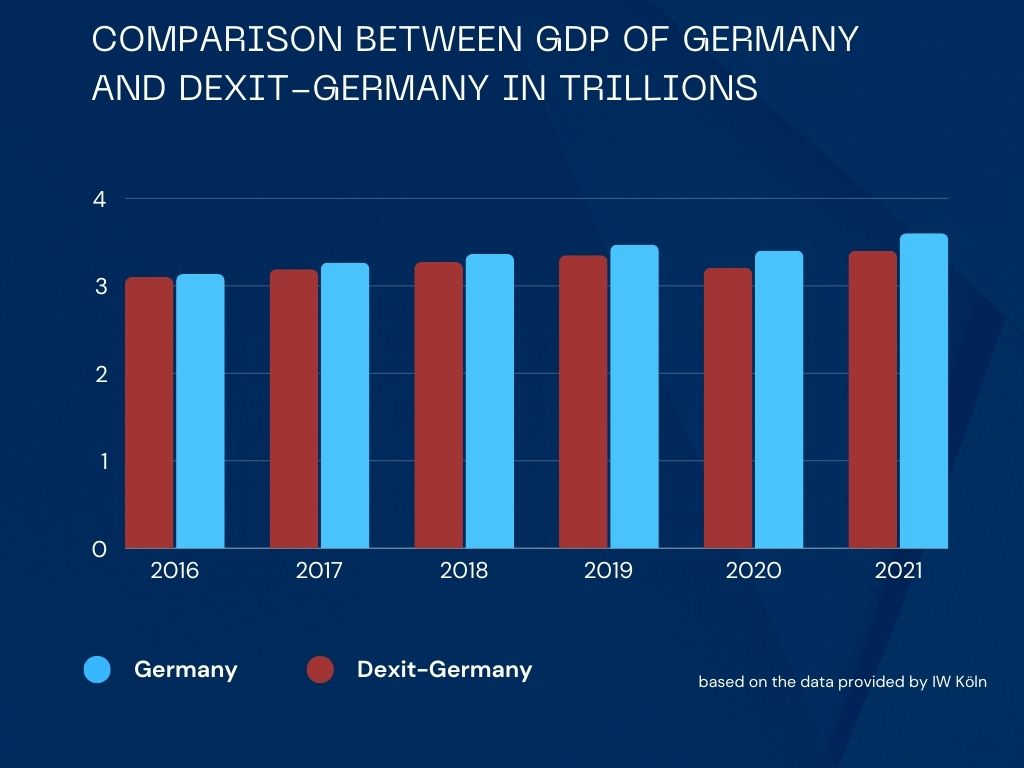In view of the upcoming elections to the European Parliament, the President of the European Commission Ursula von der Leyen had clear words on the German AfD’s plans to leave the European Union. During a speech at the CDU federal party conference on May 8, 2024, von der Leyen said about the right-wing populist party: “A Dexit like the one the AfD chooses would mean a loss of prosperity of 400 to 500 billion euros per year for Germany. In Germany as an exporting country, an AfD Dexit would be associated with an immediate loss of 2.2 million jobs.” These claims are backed by studies.
Von der Leyen’s quote refers to a study published by the Cologne Institute for Economic Research (IW Köln) in May 2024. According to scientists, a German exit from the European Union would have serious economic consequences. As an exporting nation, Germany is dependent on other EU member states, and companies and consumers would feel the effects. In order to determine the possible negative economic consequences for Germany of leaving the EU, the economists examined the economic impact of the Brexit referendum in the UK in the period from 2016 to 2021. Using a synthetic control method (SCM), the actual state (Germany is part of the EU) was compared with a hypothetical scenario (Germany leaves the EU in 2016) and provided the estimated causal benefit of the EU for Germany. The study found that five years after the Dexit decision, real gross domestic product would have fallen by 5.6%. This corresponds to a loss of 200 billion euros. If this loss is converted using the labor productivity of an average worker, 2.5 million jobs would be lost. The economic damage of a dexit increases over time, so that the total economic loss over the entire five years would amount to 690 billion euros. According to the authors of the study, the impact of a real Dexit would be even greater due to Germany’s ties with other EU states and its membership of the euro.
Knut Bergmann, Head of Communications at the Berlin office of the German Economic Institute, speaks in an interview with the Rheinische Post newspaper of a loss of economic output of around 10%, which would mean a loss of prosperity of 400 to 500 billion euros per year if Germany were to leave the European Union. He also says that 2.2 million jobs would be at risk. Here he refers to the above-mentioned transfer of the Brexit study. And the director of the institute, Michael Hüther, also confirms these figures in an interview with the newspaper Süddeutsche Zeitung.
A study published on May 27 by the Initiative Neue Soziale Marktwirtschaft (INSM) confirms that Germany’s withdrawal from the European Union would cost every German an average of around 2430 euros per year. The costs would even be twice as high in the first few years after leaving. According to INSM research, leaving the EU would lead to an average decline in real industrial value added of seven percent. INSM Managing Director Thorsten Alsleben said that no country benefits more from the EU than Germany and that Dexit would be a door to the abyss.
Germany benefits from being part of the European Union because the EU’s single market is the largest barrier-free economic area in the world. According to a study by the Bertelsmann Foundation, the EU single market increases Germany’s prosperity by 1,046 euros per person. As an export nation in particular, Germany benefits from the single market. Exports to the EU accounted for 54.6% of the total trade volume in 2023, according to a report by the German Bundestag. The fact that the EU is the most important market for German products and at the same time ensures that German companies and consumers have easy and duty-free access to consumer goods is confirmed by Sebastian Dullien, Director of the Institute for Macroeconomics and Business Cycle Research, in an interview with the Tagesschau.
Conclusion
Ursula von der Leyen’s critical statement is factually correct and backed up by experts. Germany’s exit from the European Union would have serious economic consequences for the country’s prosperity and would put more than two million jobs at risk – not “immediately”, however, as von der Leyen said, but in the years following the Dexit.
RESEARCH | ARTICLE | Luca Müller, Hochschule der Medien, Stuttgart (Germany)
Leave your comments, thoughts and suggestions in the box below. Take note: your response is moderated.







